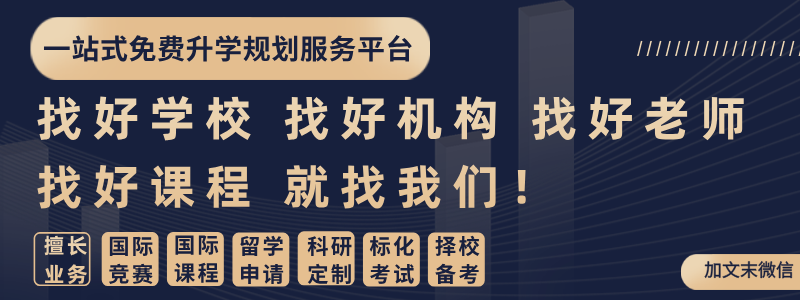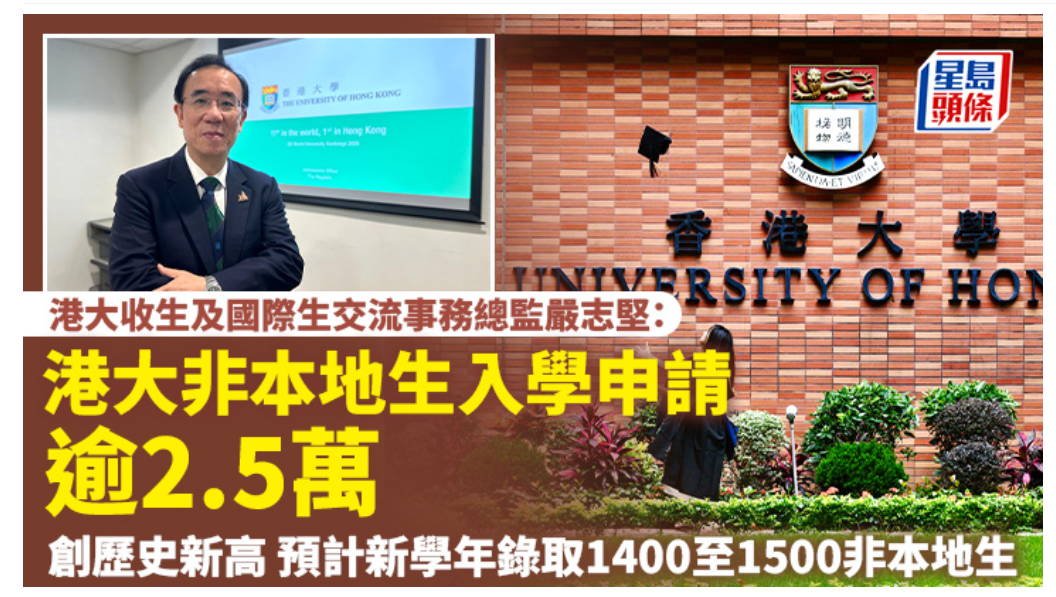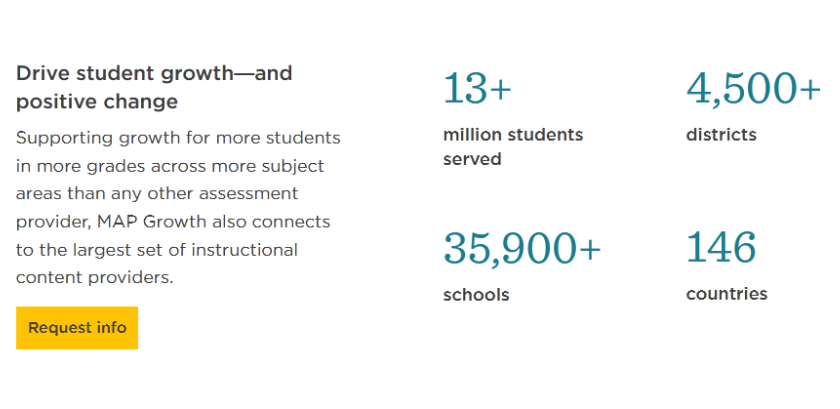这是官方对于目前不同的听力等级的划分,大家在考试的成绩单上都可以看到
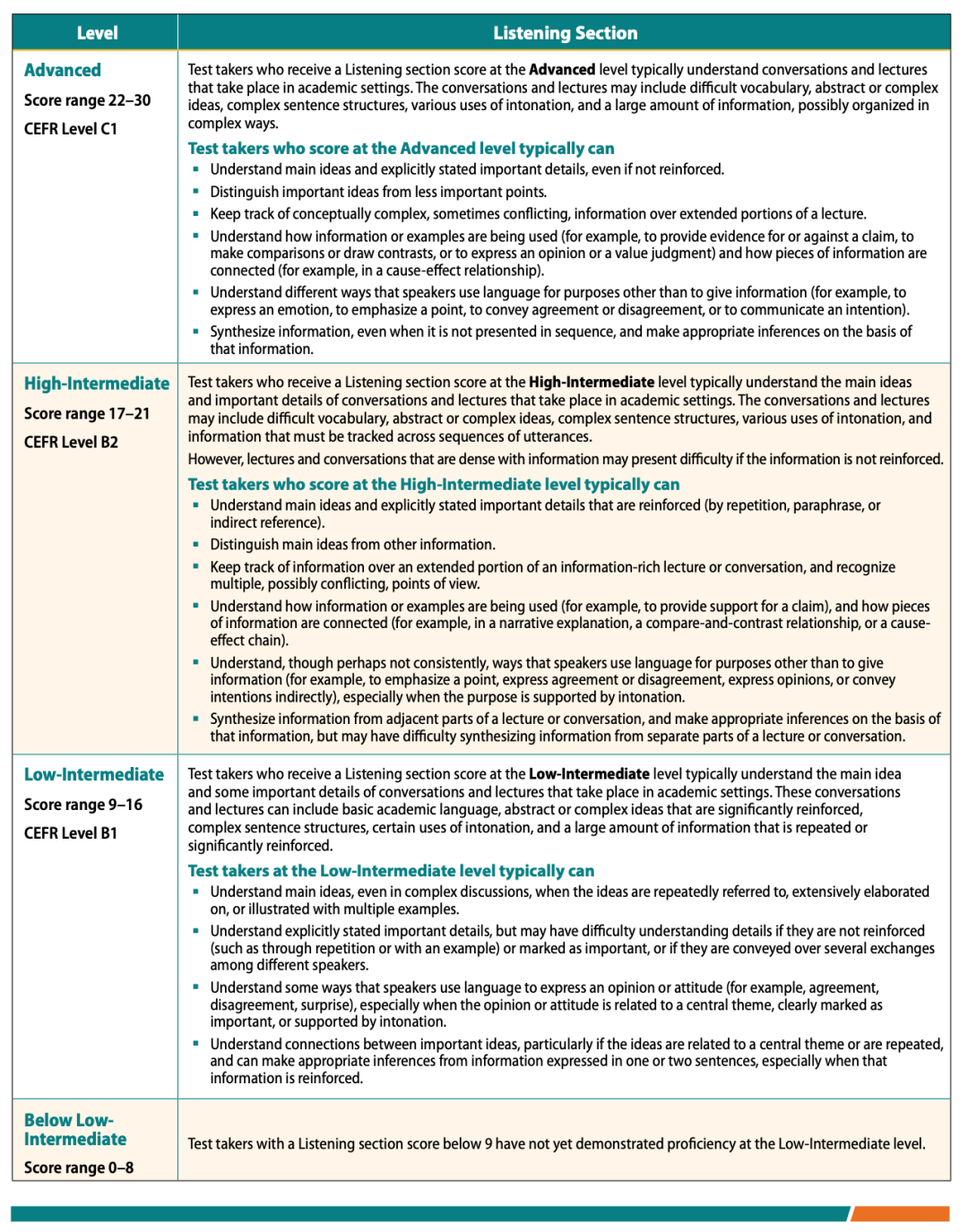
大致上符合我们习惯对于听力能力的划分,不同的是官方的能力划分上,把22以上到30 都规划到了一起,但其实22 到30 之间还可以有一个25 的断点。
即以下我们会从 20 以下//21-25// 25-28+ 3个梯队来说下听力部分的提分方案。
先来细看下官方的划分依据,看两个的:
17-21 :导语部分
Test takers who receive a Listening section score at the High-Intermediate level typically understand the main ideas and important details of conversations and lectures that take place in academic settings. 能听懂主要信息和重要的细节
对于 22+ 的导语部分:
Test takers who receive a Listening section score at the Advanced level typically understand conversations and lectures that take place in academic settings. 没有了17-21 阶段的“主要信息”的限定修饰, 22+ 的同学,就是所有的信息都能听懂了
看下具体的细则。不同的地方,用不同颜色显示
17-21 阶段的细则
Test takers who score at the High-Intermediate level typically can
■ Understand main ideas and explicitly stated important details that are reinforced (by repetition, paraphrase, or indirect reference).
■ Distinguish main ideas from other information.
■ Keep track of information over an extended portion of an information-rich lecture or conversation, and recognize multiple, possibly conflicting, points of view.
■ Understand how information or examples are being used (for example, to provide support for a claim), and how pieces of information are connected (for example, in a narrative explanation, a compare-and-contrast relationship, or a cause- effect chain).
■ Understand, though perhaps not consistently, ways that speakers use language for purposes other than to give information (for example, to emphasize a point, express agreement or disagreement, express opinions, or convey intentions indirectly), especially when the purpose is supported by intonation.
■ Synthesize information from adjacent parts of a lecture or conversation, and make appropriate inferences on the basis of that information, but may have difficulty synthesizing information from separate parts of a lecture or conversation.
22+ 的细则
Test takers who score at the Advanced level typically can
■ Understand main ideas and explicitly stated important details, even if not reinforced.
■ Distinguish important ideas from less important points.
■ Keep track of conceptually complex, sometimes conflicting, information over extended portions of a lecture.
■ Understand how information or examples are being used (for example, to provide evidence for or against a claim, to make comparisons or draw contrasts, or to express an opinion or a value judgment) and how pieces of information are connected (for example, in a cause-effect relationship).
■ Understand different ways that speakers use language for purposes other than to give information (for example, to express an emotion, to emphasize a point, to convey agreement or disagreement, or to communicate an intention).
■ Synthesize information, even when it is not presented in sequence, and make appropriate inferences on the basis of that information.
对比一下就是 20左右的是只能听到主要信息,剧情不能太复杂,并且听不出文字背后的语气。
而22以上的同学,不管剧情复杂不复杂,字面的字间的意思、态度、情绪都能明白。
那这里就有一个问题了,官方的分类貌似没有分出来我们成绩单分数的22/25/28 + 之间的区别。
那么22/25/28 一般有什么区别呢?
总的来说 22-25 还是存在能力上提高的需求的。
而25要稳定到28+ 需要的是对于题目的整理和分析。也就是25+的人能力肯定是没有问题的,但是对于考试可能了解的还不够细。
那么要怎么去提高能力,怎么去提高对于考试的了解呢?
先给下官方的推荐方式,然后相应的给下具体的实操建议
以下是官方的推荐:
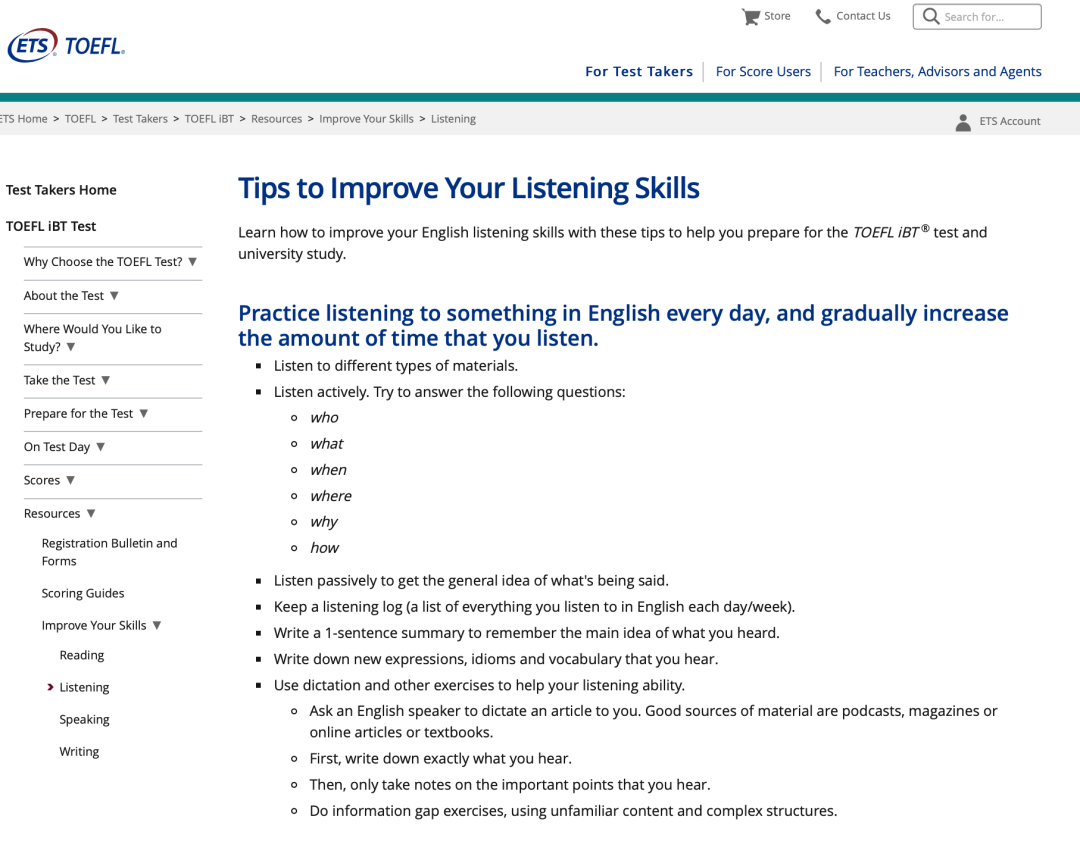
https://www.ets.org/toefl/test-takers/ibt/resources/improve-skills/listening/
具体来看下
Practice listening to something in English every day, and gradually increase the amount of time that you listen.
这部分总体来说,就是通过泛听,提高绝对的听力能力
- Listen to different types of materials. 听不同材料
- Listen actively. Try to answer the following questions: 能找到下面这些主要信息
- who
- what
- when
- where
- why
- how
- Listen passively to get the general idea of what's being said.
- Keep a listening log (a list of everything you listen to in English each day/week). 记录自己的学习过程
- Write a 1-sentence summary to remember the main idea of what you heard. 锻炼自己概括主旨的能力
- Write down new expressions, idioms and vocabulary that you hear. 积累陌生表达
- Use dictation and other exercises to help your listening ability.
用听写等方式提高听力能力- Ask an English speaker to dictate an article to you. Good sources of material are podcasts, magazines or online articles or textbooks.
- First, write down exactly what you hear.
- Then, only take notes on the important points that you hear.
- Do information gap exercises, using unfamiliar content and complex structures.
Use the resources in your community to practice listening to English.
还是属于泛听的部分,只是这是在生活里面创造一个可以听到英语的环境
- Visit places where you can practice listening.
- If possible, enroll in an English class.
- Go to a museum and take an audio tour in English.
- Follow a guided tour in English in your city.
- Call or visit a hotel where tourists stay, and get information in English about room rates, hotel availability or hotel facilities.
- Call and listen to information recorded in English, such as a movie schedule, a weather report or information about an airline flight.
- Watch or listen to TV programs and podcasts recorded in English.
- Some helpful TV channels to listen to are CNN®, Discovery Channel® and National Geographic®, as well as soap operas or situation comedies.
- Do this with a friend and talk about the program together.
- Watch movies or other videos online (turn off the captions!) or go to a movie in English.
- Listen to an audiobook in English.
- Listen to English-language recordings that come with a transcript. Listen to each recording at least 3 times: 这个3遍分析听力文本的方式可以借鉴下
- The first time, take notes about the main ideas you hear.
- The second time, read the transcript and listen for the ideas you wrote down.
- The third time, write down any words and phrases that you didn't understand, and look them up.
- Practice speaking English with others. 听说不分家
- Exchange language lessons with an English speaker who wants to learn your language.
Begin to prepare for academic situations.
以上是生活环境,以下是学习环境
- Visit academic classes conducted in English.
- Record lectures or presentations, and replay them several times.
- Listen to short sections several times, until you understand the main points and the flow of ideas.
- Stop the recording in the middle, and predict what will come next.
- Become familiar with the organization or structure of academic lectures. 分析结构
- Pay attention to the difference between main ideas and details presented.
- Listen for the general (main) ideas.
- Pay attention to details — facts, examples, opinions.
- Pay attention to the structure.
- Lecture or presentation — introduction, body and conclusion
- Narrative story — beginning, middle and end
- Learn to recognize different styles of organization.
- Theory and evidence 理论和证据
- Cause and effect 因果
- Steps of a process 过程
- Comparison of 2 things 对比对照
- Think carefully about the purpose of the lecture.
- Try to answer the question, "What is the professor trying to accomplish in this lecture?"
- Write down only the information that you hear. Be careful not to interpret information based on your personal understanding or knowledge of the topic. 学会纯粹的接收信息,不要脑补
- Develop a note-taking strategy to help you organize information into the main points and supporting details. 尝试做笔记
- Make sure your notes follow the organization of the lecture.
- Listen for related ideas and relationships within a lecture, and make sure you summarize similar information together.
- Use your notes to write a summary.
Listen for signals that will help you understand the organization of a talk, connections between ideas and the importance of ideas.
以下基本就是听力核心要考的能力的。简单概括下,就是让我们的耳朵能分辨的出来
主要的、细节的、 以及“无关信息”
- Listen for expressions and vocabulary that tell you the type of information being given. Think carefully about the type of information that these phrases show:
- opinion — I think, It appears that, It is thought that
- theory — in theory
- inference — therefore, then
- negatives — not, words that begin with "un-," "non-," "dis-" or "a-"
- fillers — non-essential information — uh, er, um
- Identify digressions — discussion of a different topic from the main topic — or jokes that are not important to the main lecture. It's OK not to understand these!
- Listen for signal words or phrases that connect ideas in order to recognize the relationship between ideas. Think carefully about the connection between ideas that these words show:
- reasons — because, since
- results — as a result, so, therefore, thus, consequently
- examples — for example, such as
- comparisons — in contrast, than
- an opposing idea — on the other hand, however
- another idea — furthermore, moreover, besides
- a similar idea — similarly, likewise
- restatements of information — in other words, that is
- conclusions — in conclusion, in summary
- Pay attention to the connections between examples.
- When you hear 2 details, identify the relationship between them.
- Write a sentence connecting the examples, using the appropriate connecting word.
- Pay attention to intonation and other ways that speakers indicate that information is important. Important key words are often:
- repeated
- paraphrased — repeated information but using different words
- said louder and clearer
- stressed
- Pay attention to body language and intonation patterns used to express different emotions.
- Emotions are often expressed through changes in intonation or stress.
- Facial expressions or word choices can indicate excitement, anger, happiness or frustration.
- Listen to how native English speakers divide long sentences into "thought groups" to make them easier to understand — a thought group is a spoken phrase or short sentence. Thought groups are separated by short pauses.
- Listen to sets of thought groups to be sure you get the whole idea of the talk.
- Listen for pauses between important points.
- Listen for numbers you might hear in prices, times or addresses.
- Listen for verbs and other expressions that show if an event is happening in the past, present or future.
- During a lecture, pay attention to words that are written on the board.
具体操练的方式,针对 LAB 听说些系统来说
20以下的同学,主要可以用听写

20-25 的可以多用下听说
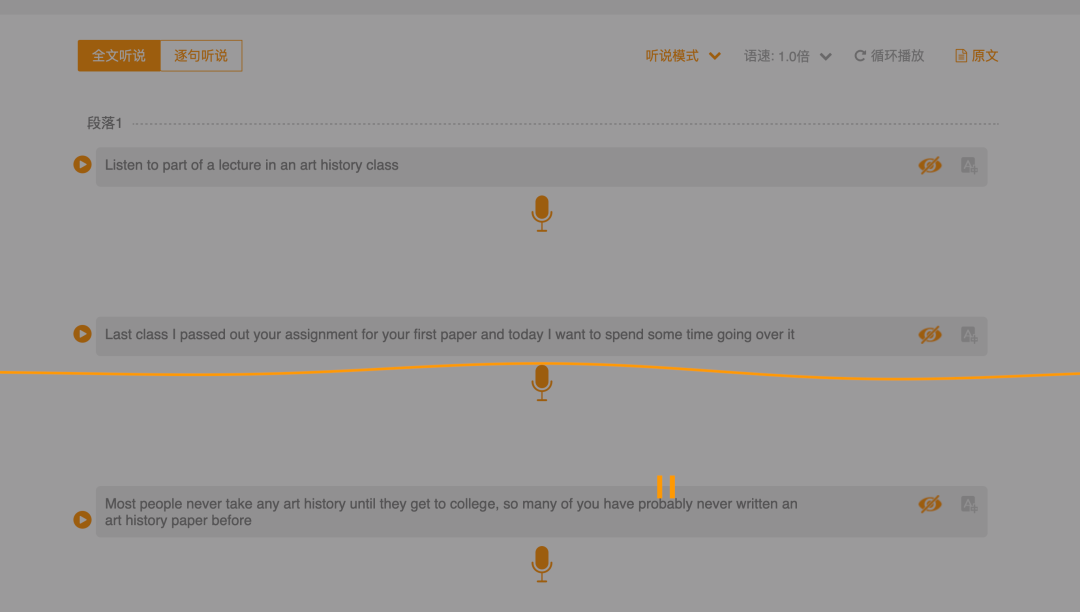
25以上的直接做题、个别错的多的篇目做完分析结构就好


